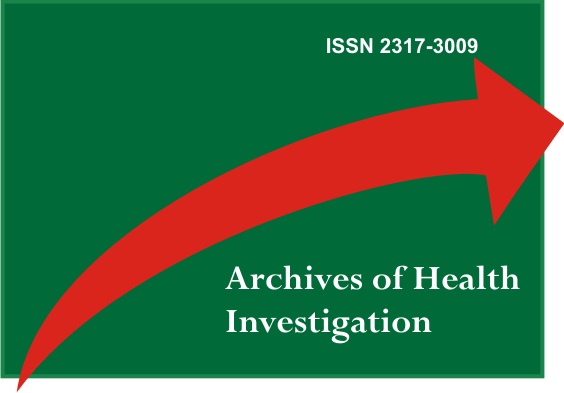Prevalence of delirium in elderly underwent surgeries with intravenous general anesthesia
DOI:
https://doi.org/10.21270/archi.v10i9.5250Keywords:
Anesthesia, General, Delirium, Old Age AssistanceAbstract
Introduction: intravenous general anesthetics (IGAs) can lead to postoperative complications, such as delirium, delaying patient's functional recovery and entails higher hospital costs. Objective: this study investigated the prevalence of postoperative delirium (POD) at a University Hospital. Methodology: a cross-sectional study in which was evaluated patients aged over 60-year-old who underwent different types of surgeries using IGA. The mini-mental state examination (MMSE) was replicated at three different moments (MMP, MM1 and MM3): during the preoperative period (D0), one day after surgery (D1) and three days after surgery (D3). Results: among the 28 patients who completed the study (50% for each sex and the most frequent age group between 60 and 69 years [64%]), most reported having between 1 and 4 years of study (53%), and the most used IGAs in decreasing order were: fentanyl (85.7%), remifentamil (78.6%), propofol (64.3%), and etomidate (50%). The prevalence of POD was 21.4% (n = 6), with 14.3% (n = 4) of cases occurring in D1, 3.6% (n = 1) in D3, and 3.6% (n = 1) in both moments, with a higher prevalence in cardiac surgeries. There was a significant (p < 0.05) higher mean score for males in the three MMSE applications. No significant difference was observed between level of education, age, type of surgery or use of IGAs and the MMSE score. Conclusion: the prevalence of POD in a sample of elderly was significant, and only the variable “sex” influenced the mean MMSE score.
Downloads
References
Cangiani M. Medicina Peri operatória, anestesia ambulatorial em paciente idoso. Rev Bras Anestesiol. 2000; 50:68-85.
de Paula TC, Bochner R, Montilla DER. Análise clínica e epidemiológica das internações hospitalares de idosos decorrentes de intoxicações e efeitos adversos de medicamentos, Brasil, de 2004 a 2008. Rev Bras Epidemiol. 2012;15(4):828-44.
Araujo PL, Galato D. Risco de fragilização e uso de medicamentos em idosos residentes em uma localidade do sul de Santa Catarina. Rev Bras Geriatr Gerontol. 2012;15(1):119-26.
Liu X, Yu Y, Zhu S. Inflammatory markers in postoperative delirium (POD) and cognitive dysfunction (POCD): A meta-analysis of observational studies. PLoSONE. 2018;13(4):e0195659.
Hudetz JÁ, Iqbal Z, Gandhi SD, et al. Postoperative cognitive dysfunction in older patients with a history of alcohol abuse. Anesthesiol. 2007;106:423-30.
Rasmussen LS, Johnson T, Kuipers HM, et al. Does anaesthesia cause postoperative cognitive dysfunction? A randomized study of regional versus general anaesthesia in 438 elderly patients. Acta Anaesthesiol Scand. 2003;47:260-66.
Anwer HMF, Swelem SE, El-Sheshai A, et al. Postoperative cognitive dysfunction in adult and elderly patients. Middle East J Anesth. 2006;18:1123-38.
Janjua MS, Arthur ME. Postoperative Delirium. NCBI Bookshelf: StatPearls Publishing;2019.
Praticò C, Quattrone D, Lucanto T, et al. Drugs of anestesia acting on central cholinergic system may cause post-operative cognitive dysfunction and delirium. Med Hypotheses. 2005 65(5):972-82.
Afonso J, Reis F. Dexmedetomidina: papel atual em anestesia e cuidados intensivos. Rev Bras Anestesiol, 2012;62(1):125-33.
Brucki S, Nitrini R, Caramelli P, et al. Sugestões para o uso do mini-exame do estado mental no Brasil. Arq Neuropsiquiatr. 2003;61(3-B):777-81.
Bisinotto FMB, Silveira LAM, Silva RO, et al. Delirium pós-operatório no idoso. Onde estamos? Rev Med Minas Gerais. 2017;27(Supl 2):S52–S66.
Djokovic JL. Prediction of outcome of surgery and anesthesia in patients over 80. JAMA. 1979;242(21):2301-6.
Bryson GL, Wyand A. Evidence-based clinical update: General anesthesia and the risk of delirium and post-operative cognitive dysfunction. Can J Anaesth. 2006;53:669-77.
Dasgupta M, Dumbrell AC. Preoperative risk assessment for delirium after noncardiac surgery: A systematic review. J Am Geriatr Soc. 2006; 54(10):1578-89.
Papaioannou A, Fraidakis O, Michaloudis D, et al. The impact of the type of anaesthesia on cognitive status and delirium during the first postoperative days in elderly patients. Eur J Anaesthesiol. 2005;22(7):492-99.
Orena EF, King AB, Hughes CG. The role of anesthesia in the prevention of postoperative delirium: a systematic review. Minerva Anestesiol. 2016;82(6):669-83.
Melo DM, Barbosa AJG. O uso do Mini-Exame do Estado Mental em pesquisas com idosos no Brasil: uma revisão sistemática. Ciênc saúde colet. 2016;20(12):3865-76.
Silverstein JH, Timberger M, Reich DL, et al. Central nervous system dysfunction after noncardiac surgery and anestesia in the elderly. Anesthesiol. 2007;106:622-28.
Croughwell ND, Newman MF, Blumenthal JA, et al. Jugular bulb saturation and cognitive dysfunction after cardiopulmonary bypass. Ann Thorac Surg. 1994;58:1702-8.
Machado H, Pereira MJB, Orfão J, et al. Changes in cognitive performance in patients submitted to anesthesia. Acta méd port. 2000;13(3):85-92.
Boos GL, Soares LF, De Oliveira Filho GL. Disfunção Cognitiva Pós-Operatória: Prevalência e Fatores Associados. Rev Bras Anestesiol. 2005;55(5):517-24.
Kehlet H, Dahl JB. Anaesthesia, surgery, and challenges in postoperative recovery. Lancet. 2003; 362(9399): 1921–1928.
Robinson TN, Raeburn CD, Tran ZV, et al. Postoperative delirium in the elderly: risk factors and outcomes. Ann Surg. 2009;249(1):173–8.


